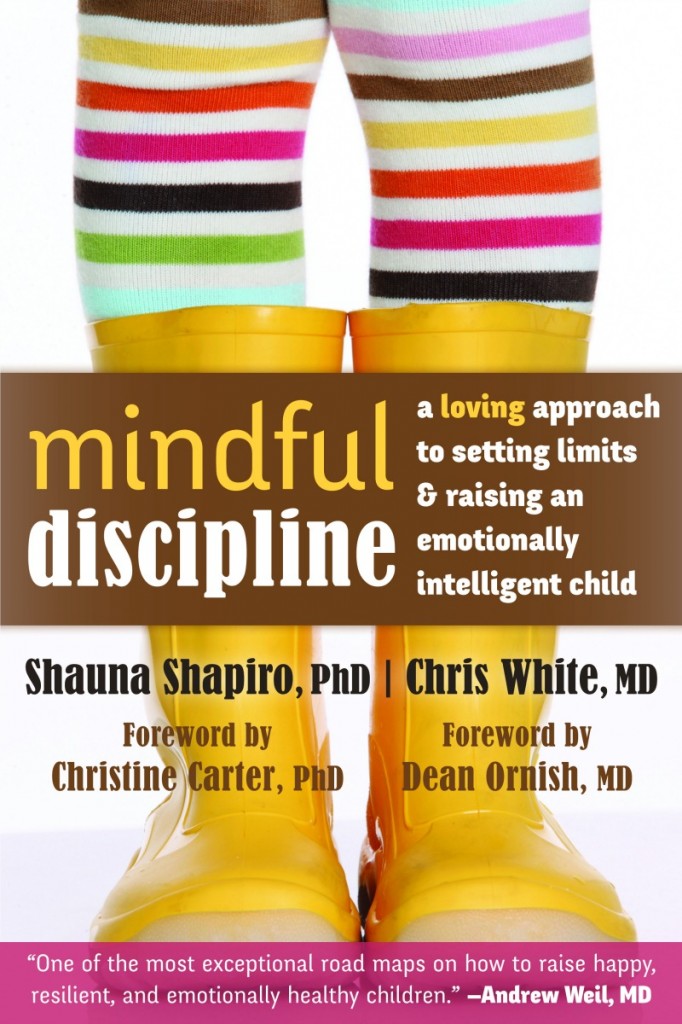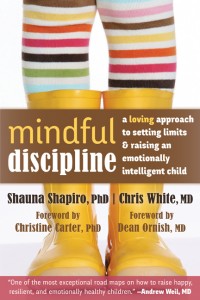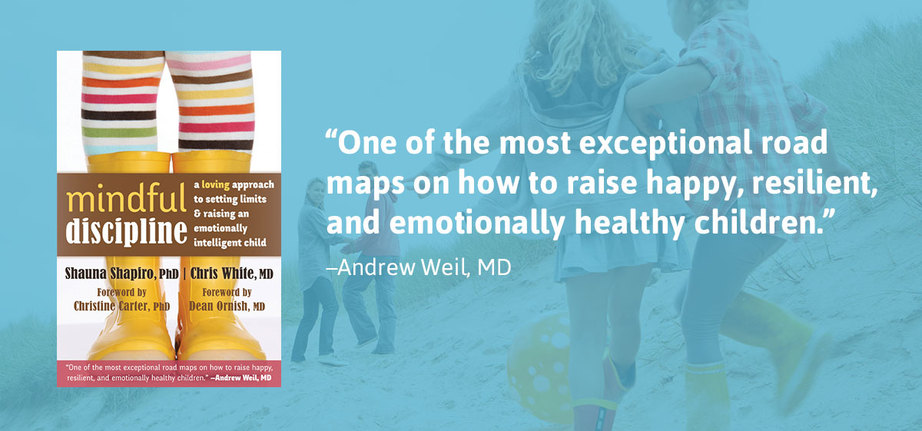Mindful Discipline: A Loving Approach to Setting Limits and Raising an Emotionally Intelligent Child
 Editor’s Note: Kindred is proud to be a launch partner with our contributing writer, Chris White, MD, for the forthcoming and much-hailed book, Mindful Discipline.
Editor’s Note: Kindred is proud to be a launch partner with our contributing writer, Chris White, MD, for the forthcoming and much-hailed book, Mindful Discipline.
Mindful Discipline is a Kindred Book of the Month selection for June 2014 because of its courageous contribution to “Sharing the New Story of Childhood, Parenthood and the Human Family.” Sign up for Kindred’s e-newsletter to receive notices of Kindred Fireside Chats by texting KINDRED to 22828.
To explore the New Story with like-hearted souls, find or start a Kindred Book Club. Email us for more information at info@KindredCommunity.org
A Mindful Discipline Audio Interview with Chris White, MD
Enjoy the Kindred Fireside Chat above with Chris White, MD, who shares insights about the book, his parent support work as an attachment dad and medical doctor, and his path to co-authoring Mindful Discipline.
“Do not doubt your own basic goodness. In spite of all
confusion and fear, you are born with a heart that knows
what is just, loving, and beautiful.”
—Jack Kornfield, The Art of Forgiveness, Lovingkindness, and Peace
Introduction to Mindful Discipline
A Book Excerpt
Parenting may be the most profound and meaningful endeavor of our lives. We are pushed out of our comfort zone day after day, challenged and made uncomfortable in ways we never imagined. But most of us would do it all over again in a heartbeat; our children are worth every drop of our blood, sweat, and tears.

And yet, none of us want this job forever. We hope the joys of being a parent continue indefinitely, but the work of parenting is another story. Children can be incredibly difficult at times, refusing to cooperate with even the most basic of requests, like “Will you please hang up your coat?” or “Can you be more gentle with your baby brother?” We do our best to keep our cool, to understand their perspective and respect their autonomy, but it can be terribly frustrating.
In our conversations with parents, two main themes emerge again and again. First, parents tell us they want to create a harmonious home that flows smoothly and is restful. We all want our homes to be nurturing and intimate environments that bring out the best in each family member. Second, parents express the desire that their children grow up into mature individuals who can increasingly steer their own ship. We want them to feel a sense of commitment to their own lives and to the people around them, and we want to help them develop the skills necessary to act in responsible and respectful ways. We hope that through the development of healthy self- discipline they will become empowered to enjoy happy, meaningful, and authentic lives.
A key to creating harmony in the home and helping children thrive is the practice of discipline. Over the last fifty years, much has been written about parenting and discipline. Some “parent- centered” approaches are focused primarily on getting control over children, but not on the long- term goals of healthy self- discipline. Other parenting books— sometimes called “child- centered” approaches— are written in reaction to the more authoritarian and controlling methods. These approaches can leave parents with the impression that children are fragile and can’t handle not getting their way— that they must always be pacified or coddled to prevent “trauma.” This is a misunderstanding of how emotional intelligence and resilience actually develop. The research is clear that discipline, when it is healthy and balanced, plays an essential role in the raising of emotionally intelligent, self- disciplined children who thrive (Grolnick 2009). We felt that a new approach— a “relationship- centered” approach— needed to be articulated in order to empower you as a parent and to support your child in one day being able to guide her or his own life with wisdom and integrity.
The word “discipline” often evokes strong emotional reactions, particularly because it is often used synonymously with “punishment.” However, the original meaning of discipline is “to teach.” The Mindful Discipline approach offers a conscious path toward teaching our children to find their innate wisdom while simultaneously transforming our house into a more restful and harmonious home.
Creating a harmonious home and supporting self- discipline in our children requires that we as parents become more self- disciplined. With intentional practice, our own self- awareness, self- regulation, and self- discipline coevolve and mutually support these qualities in our children. By seeing discipline as a loving container for optimal development, we parents and our children can grow and learn together. As author and teacher Frank Marrero says, “Discipline is the obligation of relationship” (personal communication, 2010). We learn the value of respect and cooperation by experiencing teamwork in the home. We see firsthand both how personal responsibility is empowering and how it helps create a safe and restful place where all family members can thrive. It is the relationship— the context of love and respect—that motivates us beyond our personal needs and impulses, and inspires the development of self- discipline.
Nature’s Plan
Here’s the good news: raising children is not all up to us! Nature is on our side. Self- discipline, emotional intelligence, and resilience are hardwired into human growth and development.
In a way, your child is like a plant. She starts out as a seed: full of potential, but undeveloped. If the seed receives the nourishment it needs, it will grow roots, push its way out of the ground, and develop through various phases: shoot, sapling, and, eventually, a full-grown tree that bears the fruit of maturity.
You, the parent, are like a gardener. Your role is to provide the nourishment needed in order for the plant to survive and thrive. If the plant’s growth seems to be stalled, you try first to understand what form of nourishment might be missing. More water? Which nutrients? Protection from other invasive species? A gardener knows that she can’t simply shout at the plant to make it grow faster. Nor will pushing and pulling it result in a tree’s maturing and bearing fruit before its time (Neufeld and Maté 2004).
Nature unfolds in its own way and its own time. We play an important role in our child’s development, but it is not all up to us. Our job is to read our children’s needs, do our best to provide the nourishment, and be patient. We must trust ourselves, our children, and the developmental process.
The Parent’s Role
 Our role as parents is to support nature in growing our children up by providing certain forms of nourishment. The nourishment that children need to become self- disciplined falls into five categories of experience that we call the five essential elements of Mindful Discipline: 1) unconditional love, 2) space, 3) mentorship, 4) healthy boundaries, and 5) mistakes. On one hand, children need to know that they are perfect exactly as they are. When we love them unconditionally and give them space to be themselves, they retain a basic trust in the world and a sense of their inherent value as human beings. Feeling a degree of autonomy, they remain curious, engaged, and develop an increasing sense of responsibility over their lives.
Our role as parents is to support nature in growing our children up by providing certain forms of nourishment. The nourishment that children need to become self- disciplined falls into five categories of experience that we call the five essential elements of Mindful Discipline: 1) unconditional love, 2) space, 3) mentorship, 4) healthy boundaries, and 5) mistakes. On one hand, children need to know that they are perfect exactly as they are. When we love them unconditionally and give them space to be themselves, they retain a basic trust in the world and a sense of their inherent value as human beings. Feeling a degree of autonomy, they remain curious, engaged, and develop an increasing sense of responsibility over their lives.
However, children also need mentorship and healthy boundaries. These two elements communicate to children, “While it is true that you are perfect as you are, it is also true that you have a long way to go.” Children have a lot to learn about the workings of the world we live in, and it requires a great deal of time, guidance, and practice to develop the skills that comprise healthy self- discipline. Mentorship and healthy boundaries help children develop impulse control, emotional intelligence, and the ability to adapt in the face of adversity.
Lastly and perhaps most surprisingly, our mistakes can end up nourishing our children. We write “mistakes” instead of “mistakes” to signify that these are “missed takes”— moments or occasions when we missed the mark and need to correct course. In this way, mistakes can be seen as potentially beneficial and nourishing, rather than simply bad or wrong. When we recognize our misstep and move to reconnect and repair, both we and our children learn and grow. Relationships are a messy affair, and children learn from seeing their parents’ authentic struggles with self- discipline. The times we lose our cool or act unskillfully create an opening where humility, forgiveness, and compassion can bring us closer with our child and grow each of us up in the process. The shadow aspects of ourselves often lead to the deepest of healing and intimacy. The lotus flower grows in the muddiest of swamps: as the common Buddhist saying goes, “No mud, no lotus.”
In order to provide the nourishment our children need, we need to first ensure we embody the right relationship with them. Nature has intended for the parent- child relationship to be a loving hierarchy (Neufeld and Maté 2004). Dependent young children are born into our loving arms and we are responsible for protecting, caring for, and guiding them. To be clear, we are not talking about the pathological and destructive form of hierarchy where parents are not attuned to the needs of their children and use and abuse them out of their own self- centeredness. Such dominance hierarchies are what characterize an unhealthy authoritarian approach to discipline.
But the limbic brain of a young child instinctively looks for a loving authority to take the lead in caring for him. (The limbic brain is the group of brain regions we share with all social mammals that is responsible for functions like caretaking of offspring and social- emotional learning and functioning.) The permissive approach to parenting leaves children feeling unsafe. Children are not meant to be in charge of their parents. Nature did not intend for them to run our households. There are times to let them practice leading, and times for democratic decision making, but a loving hierarchy is the most healthy arrangement for your child’s development. A loving hierarchy provides the structure and boundaries required for our children to feel safe: to know that someone more experienced is at the helm. If we balk at this responsibility, our children and our families will suffer. We’ll talk more about authoritarian and permissive styles of parenting— as well as the more nourishing authoritative style— in chapter two.
How Mindful Discipline Will Help You Parent
Mindful Discipline is an intentional, yet flexible approach to raising children of all ages. Although this book has focused suggestions for children ages one to ten, the concepts can be applied to any stage of development. We have found it most effective to focus on principles, rather than merely trying to apply techniques not rooted in deeper understanding. So here we offer a theoretical model accompanied by specific practices designed to help children grow into healthy, emotionally intelligent, and self- disciplined individuals. The guiding premise is that our role as parents is to discern what nourishment is needed, moment by moment, and to provide the nourishment that nature needs to bloom our children into their full potential. We offer this book to support you in becoming the most trustworthy, flexible, and intuitive gardener- parent you can be.
Parenting approaches to discipline often attempt to train children through the consistent application of punishments and rewards. This works great for dogs and other animals, but as we’ll discuss, when used on children, the downsides to their development and to your relationship greatly outweigh the upsides. A key aspect of the Mindful Discipline approach is a shift from focusing on behaviors to instead identifying and responding to the underlying needs of your child. Sometimes the need is space, sometimes it is a firm boundary. Attending to these needs is the provision of nourishment and supports your child’s development into a joyful, autonomous, and responsible young adult.
Seeing clearly is the crucial first step to providing what is needed. That is why mindfulness is a key element of the approach found in this book. Mindfulness can be simply defined as “attending to the present moment with a kind, curious attitude.” It helps us see clearly what is actually here in the present moment, and invites us to be fully present with our children, to attune to them and see them clearly in their full sovereignty and vulnerability. When we begin to regularly incline our attention to what is actually happening now, rather than acting and reacting on autopilot, we begin to see clearly what is the most skillful, nurturing response in any given moment. Being in touch with reality— and in touch with our hearts— we learn to find our way to the appropriate response that will serve our children and our families. Finding the appropriate response is the practice of an entire lifetime, and is not reducible to a formula or technique. To respond appropriately we have to be present. Thus, Mindful Discipline invites us to wholeheartedly meet our children, ourselves, and life, moment by moment.
In addition to helping you see reality more clearly, the mindfulness awareness practices (MAPs) we offer throughout the book will help your parenting become embodied rather than conceptual (Siegel 2007). Children respond more to our state of consciousness than to our words. When we are present, grounded, and clear, our children listen. When we are angry and attacking, they shut down or act out more. MAPs can help us self- regulate when we find ourselves contracted, frustrated, furious, or stuck. Having a practice to go to when you are about to become dysregulated can save your family from cycles of guilt, shame, resentment, and more acting out.
The intention is to discipline ourselves before disciplining our children. We need to learn to regulate and care for ourselves before we can care for our children. We can look to the wisdom of our body as a model: the heart pumps blood to itself first before pumping blood to the rest of the body. If it didn’t, the heart would die, and then the rest of the body would die. We as parents need to learn how to bring self- regulation and self- care to our own lives so that we can help cultivate these nourishing capacities in our children.
Finally, we want to acknowledge the challenge of writing a book for parents. We do not want this to be another book that talks to you from an ivory tower of what you should do, and we definitely do not want to add to any feelings of guilt. We know parenting is hard, because we are parents. For us personally, parenting has been the most challenging journey we have embarked upon, and we are right in the thick of it with you. We offer this book with humility and with the knowledge that chaos and challenge will be part of the process. Sometimes you will have the patience of a saint. Other times, you will be pushed beyond your edge. Please hold our suggestions as a set of best practices, knowing that we are right there with you, stumbling along and making plenty of messes ourselves.
We have found that what is most important is not to try to be perfect, but rather to allow space for the messes and imperfections, and to practice holding them in a context of self- compassion. Becoming aware of our parenting patterns and reactions can be quite painful, and it is essential to bring an open, nonjudgmental heart to as many moments as we can. When we hold our difficult feelings—even the seemingly unforgivable ones— with compassion, we set the stage for healing and growth. As parents, we must learn to trust ourselves. As Jack Kornfield reminds us, “Do not doubt your own basic goodness. In spite of all confusion and fear, you are born with a heart that knows what is just, loving, and beautiful” (2002, 9).
Our deepest desire as parents is to see our children thrive— to see them grow into healthy, joyful, emotionally intelligent beings. Our aspiration is to support them in this process. Pause for a moment and feel the wholesomeness and natural goodness of this intention. You care. You love your child. You can trust this. And yet, lived experience often becomes far removed from this natural and deeply wholesome love. We become lost in a wilderness of chaos and confusion and we are searching for our path back. Mindful Discipline is an approach to parenting that helps guide us effectively back toward this innate path of love and wisdom.
How This Book Is Organized
This book has three parts. In the first five chapters, we outline a new approach to discipline called Mindful Discipline. Mindful Discipline is an integrative approach that embraces discipline as one dimension of a healthy, wise, and loving relationship. We introduce mindfulness, a powerful practice that transforms how we see and experience our children. Mindfulness supports us in skillfully providing the most appropriate response to our particular child in his or her particular circumstances. Bringing mindfulness to discipline will transform the way in which you parent, and the way in which you live. We reframe the concept of “discipline” to help you see it with fresh eyes. This new understanding helps you make sense of the often opposing approaches to discipline currently espoused in our culture. From this reframed and cohesive big- picture view, we parents are able to recognize that children need a variety of experiences to grow up whole and reach their full potential: not just love and respect, not just autonomy and space, not just teaching and emotional coaching, and not just limits on their behavior.
In the second part of the book, we focus on the five essential elements of Mindful Discipline and how they lead to self- disciplined, emotionally intelligent, and resilient children. Each chapter from six to ten describes a core element— unconditional love, space, mentorship, healthy boundaries, and mistakes— and what qualities develop when that element is provided. We offer practical examples of how to incorporate each element into everyday life, as well as specific practices to increase your embodiment of a loving authority. The final chapters describe how these five elements affect the wiring up of the brain in a healthy way, allowing our children to enjoy happy, meaningful, and fulfilling lives.
The end of the book contains resources to support you as you continue on this path of parenting. We offer appendices, a references section, and a list of suggested further readings.
At the deepest level, we as parents already know the principles detailed in this book. Our intention in writing Mindful Discipline is simply to help you draw upon your innate wisdom. This book is offered as a reminder that the nourishment your child needs is already in your naturally wise and loving heart. Life has decided that you are exactly who your child needs to reach her full potential. Yes, we as parents are far from perfect, but our love and commitment is deep. Trust yourself. Trust your child and his process. Enjoy the journey!
Advanced Praise for Mindful Discipline

“Shauna Shapiro and Chris White have created a wonderful integration of the power of mindful awareness and the insights from studies of child development and the brain to lovingly guide us to a more rewarding and effective way of being as parents.” —Daniel J. Siegel, MD (pioneering leader of the field of Interpersonal Neurobiology)
“This reader-friendly book is a masterful guide for parents. With great gentleness and humility, Mindful Discipline weaves together the rigor of science, the wisdom of reflection, and decades of clinical experience, offering parents one of the most exceptional road maps on how to raise happy, resilient, and emotionally healthy children.” —Andrew Weil, MD
“If you raise your children with respect for who they are, nourishing compassion, clarity, and wise limits they will bloom and blossom. The tools for mindfully doing so are here in these pages.”—Jack Kornfield, PhD, author of A Path With Heart


